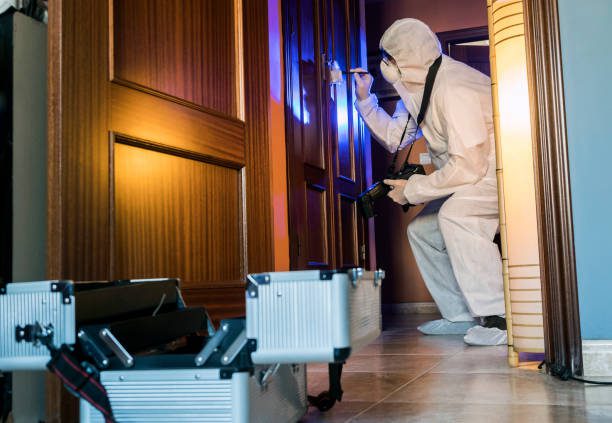
| Fingerprint Technician Key Stats | |
|---|---|
| Education | 4+ Years |
| Job Outlook | 14% |
If you’re interested in law enforcement and looking for a career that will allow you to make a difference, then you might like to become a fingerprint technician.
A fingerprint technician is sometimes known as a latent print examiner.
A fingerprint technician is called out to a crime scene where they collect evidence, which they will later analyze back in a lab setting.
If you are a strong logical thinker, and also a good problem solver, then chances are you will enjoy a role as a fingerprint technician.
This job offers variety, with working time spent both on the field as well as in the lab.
It’s also a very rewarding role, as you are making a difference to your community by making a contribution to law enforcement.
Table of Contents
Education Requirements to Become a Fingerprint Technician
To become a fingerprint technician, you will first need to complete your high school diploma or GED.
After this, you will need to complete a four year bachelor’s degree in college with a major sequence in forensic science or criminal justice.
While at college, you should try and take any opportunity to complete intern work that arises.
This is a good way to start working as a fingerprint technician and gain experience.
Nearly all fingerprint technicians are employed by law enforcement agencies.
After graduation, you may wish to approach state and federal branches of law enforcement in regard to work as a fingerprint technician.
You can also become a certified fingerprint technician.
Certification is issued by the The International Association for Identification.
You can read more about the certification process on their website.
Certification is not required, but may be helpful in gaining job opportunities.
Fingerprint Technician Job Description
Fingerprint technicians are forensic scientists who are specialists in the field of fingerprint identification and categorization.
Their work helps to identify criminals, as well as victims of crime, and those that are injured or killed in accidents.
No two people have the same fingerprints, just as no two have the same DNA.
A fingerprint technician is called out to the scene of a crime where they will search for any traces of fingerprint on surfaces.
Using a variety of techniques, they will lift copies of these prints, which they will then take back to the lab for processing.
Back at the lab, the fingerprints will be recorded.
They will be matched to any persons who were known to be at the scene that is being investigated.
Unknown prints will also be categorized, and compared to the bank of prints already on file in a database.
They may be used to identify offenders, and later used in court.
Working as a fingerprint technician mostly involves a forty hour week, however there are many circumstances where you would be required to be on call and may need to attend a crime scene at after hours.
Here are some of the tasks of a fingerprint technician:
- Attend a crime scene
- Check a scene for fingerprints
- Take copies of prints
- Check prints against records and databases
- Prepare reports
- Testifying in court
- Data entry
Fingerprint Technician Salary and Career Path
When you become a fingerprint technician, you will most likely be employed by a law enforcement agency.
Fingerprint technicians are employed by local police departments, as well as state and federal level law enforcement agencies.
Fingerprint technicians are also employed by other types of organizations, for instance hospitals, governments, and in private security firms.
Working as a fingerprint technician you could expect to earn between $40,000 and $50,000 a year.
Your salary would depend on the kind of organization you worked for and the responsibility attached to your role.
Many fingerprint technicians move on to work in other areas of law enforcement.
Some similar roles to that of a fingerprint technician include:
- Forensic Scientist
- Police Detective
- Crime Scene Investigator
- FBI Agent
- Police Officer
- Private Investigator
If you want to work in law enforcement, but you think that you would be better at more detailed analysis work in a lab than the action out on the streets, you might like to become a fingerprint technician.
The work is involved, complex, and calls for a lot of work in the lab; however there is also plenty of opportunity to move into other areas of law enforcement with some experience.
![]() The below information is based on the 2023 BLS national averages.
The below information is based on the 2023 BLS national averages.
National Average Salary
$95,930Average Salary by State
| State | Avg. Annual Salary |
|---|---|
| Alabama | $76,990 |
| Alaska | $121,770 |
| Arizona | $94,190 |
| Arkansas | $63,040 |
| California | $115,910 |
| Colorado | $99,780 |
| Connecticut | $100,530 |
| Delaware | $101,440 |
| Florida | $88,610 |
| Georgia | $71,610 |
| Hawaii | $121,000 |
| Idaho | $83,270 |
| Illinois | $95,820 |
| Indiana | $74,780 |
| Iowa | $84,090 |
| Kansas | $70,570 |
| Kentucky | $78,850 |
| Louisiana | $73,680 |
| Maine | $87,010 |
| Maryland | $119,900 |
| Massachusetts | $112,480 |
| Michigan | $99,450 |
| Minnesota | $85,390 |
| Mississippi | $64,580 |
| Missouri | $80,910 |
| Montana | $91,590 |
| Nebraska | $93,840 |
| Nevada | $95,380 |
| New Hampshire | $88,460 |
| New Jersey | $107,910 |
| New Mexico | $82,700 |
| New York | $118,350 |
| North Carolina | $71,870 |
| North Dakota | $82,240 |
| Ohio | $88,170 |
| Oklahoma | $82,610 |
| Oregon | $106,320 |
| Pennsylvania | $98,160 |
| Rhode Island | $96,290 |
| South Carolina | $73,600 |
| South Dakota | $84,000 |
| Tennessee | $76,680 |
| Texas | $88,300 |
| Utah | $87,620 |
| Vermont | $99,200 |
| Virginia | $106,850 |
| Washington | $114,450 |
| West Virginia | $92,110 |
| Wisconsin | $88,660 |
| Wyoming | $84,910 |
| Puerto Rico | $81,910 |
The top earning state in the field is Alaska, where the average salary is $121,770.
These are the top 5 highest-paying states in the field:
* Employment conditions in your area may vary.
Frequently Asked Questions
What is a Fingerprint Technician?
Fingerprint technicians are forensic laboratory analysts who specialize in processing and examining fingerprint evidence.
They usually work in forensic laboratories or for a law enforcement agency.
Fingerprint technicians communicate their findings to their supervisors, police detectives, investigators, and court officials.
They use databases, such as the Automated Fingerprint Identification System, to identify individuals based on fingerprints.
Fingerprint technicians usually work standard hours but they may have to be present in the laboratory outside of normal business hours if they are needed to work immediately on a case.
Along with professional expertise, fingerprint technicians also need critical-thinking, problem-solving, and math and science skills.
They must be able to follow a strict protocol in order to preserve evidence and provide reliable conclusions and they must be able to thoroughly document their findings in written reports and through oral presentations.
Fingerprint technicians can also be called to testify in court, therefore they also need good communication skills.
How much does a Fingerprint Technician make?
According to the Bureau of Labor Statistics, the annual median pay for forensic science technicians was $58,230 in May of 2018.
How much a forensic scientist makes varies depending on many factors, including his or her level of experience and the employer.
The lowest 10 percent earned a median pay of $34,600 per year, while the top 10 percent earned $97,200.
How much does it cost to become a Fingerprint Technician?
Fingerprint technicians, like all forensic scientists, need at least a bachelor’s degree in biology, chemistry, forensic science or a related field.
How much will it cost to get your degree depends on the educational institution you choose.
Total costs for a bachelor’s degree in forensic science range between $11,000-$54,000 per year.
Applicants who also hold a master’s degree have better chances of being employed in the field.
What is the demand for Fingerprint Technicians?
According to the Bureau of Labor Statistics, the demand for forensic scientists is expected to grow 14 percent by 2028, much faster than the average for all occupations.
The exact number of jobs available in your region depends on the level of government spending.
State and local governments are expected to hire additional forensic scientists to help solve their cases.
The demand for forensic scientists is expected to grow in the future, thanks to technological advances that are expected to make forensic evidence even more reliable.
How long does it take to become a Fingerprint Technician?
In order to become a fingerprint technician, you will need at least a bachelor’s degree in forensic science or a related field.
Many colleges offer programs in forensic science and you can get your bachelor’s degree in four years.
A master’s degree gives you better job prospects.
Obtaining your master’s degree in this field will take an additional 2 years.
Fingerprint technicians also receive on-the-job training before being ready to work on cases independently.
Some employers also require candidates to hold a 5-year certification by the International Association of Identification.













